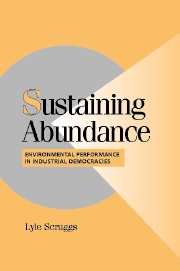Book contents
- Frontmatter
- Contents
- List of Figures and Tables
- Preface
- 1 INTRODUCTION
- 2 MEASURING NATIONAL ENVIRONMENTAL PERFORMANCE
- 3 ECONOMIC DEVELOPMENT, GEOGRAPHIC ADVANTAGE, AND ENVIRONMENTAL PERFORMANCE
- 4 PUBLIC OPINION, ENVIRONMENTAL MOBILIZATION, AND ENVIRONMENTAL PERFORMANCE
- 5 PLURALISM, CORPORATISM, AND ENVIRONMENTAL PERFORMANCE
- 6 POLITICAL INSTITUTIONS
- 7 CHECKING THE ROBUSTNESS OF THE RESULTS
- 8 CONCLUSION
- Appendix I Estimated Measures of Environmental Performance
- Appendix II Institutions for Environmental Policy Making in Fourteen Countries
- References
- Index
- Titles in the series
Appendix II - Institutions for Environmental Policy Making in Fourteen Countries
Published online by Cambridge University Press: 07 December 2009
- Frontmatter
- Contents
- List of Figures and Tables
- Preface
- 1 INTRODUCTION
- 2 MEASURING NATIONAL ENVIRONMENTAL PERFORMANCE
- 3 ECONOMIC DEVELOPMENT, GEOGRAPHIC ADVANTAGE, AND ENVIRONMENTAL PERFORMANCE
- 4 PUBLIC OPINION, ENVIRONMENTAL MOBILIZATION, AND ENVIRONMENTAL PERFORMANCE
- 5 PLURALISM, CORPORATISM, AND ENVIRONMENTAL PERFORMANCE
- 6 POLITICAL INSTITUTIONS
- 7 CHECKING THE ROBUSTNESS OF THE RESULTS
- 8 CONCLUSION
- Appendix I Estimated Measures of Environmental Performance
- Appendix II Institutions for Environmental Policy Making in Fourteen Countries
- References
- Index
- Titles in the series
Summary
This appendix briefly characterizes the degree of corporatism in environmental policy-making institutions that was summarized in Table 5.1. These descriptions should be taken as evidence demonstrating that national approaches to environmental policy resemble traditional approaches to policy making. Countries included in the environmental performance measures that do not have entries here are not covered due to a lack of data on their environmental policy institutions.
Austria (strong)
Austria has a long tradition of consensual policy making based on tripartite bargaining between peak economic interest organizations and the government in most major policy matters. The prevailing approach to environmental policy has also been one of cooperation and consensus seeking between the industry and labor confederations and the state. In its review of Austrian environmental performance, the OECD (1995a) noted that the regulatory instruments upon which Austrian environmental policy was constructed in the 1970s and 1980s were extensively negotiated with these social partners. There was also close cooperation between public authorities at all levels (federal, state, and local) and the private sector. Business and labor interests participate in official discussions in legislative process and in the chambers of commerce. A recent project report, the Joint Environmental Policy-Making Project, characterized Austria as having a “corporatist” policy-making style (JEP 1998).
One problem area in Austria has been the limited formal participation of environmental groups. The OECD, for example, suggested that such groups have been influential in particular cases but mainly as a result of protest rather than full incorporation into the process.
- Type
- Chapter
- Information
- Sustaining AbundanceEnvironmental Performance in Industrial Democracies, pp. 219 - 228Publisher: Cambridge University PressPrint publication year: 2003

